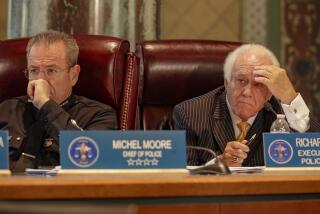Ban on Walk-In Clinics Expires as City Ponders Next Step : Medicine: Local guidelines on quality of care might be costly, ineffective and could clash with state agencies, staff report says.
HUNTINGTON PARK — The City Council, in a quandary about how--or whether--to monitor the growing number of walk-in medical clinics in the city, allowed a temporary ban on the facilities to expire this week.
A preliminary staff report given to the council Monday said local controls of clinics would be costly and might not be effective. However, the city staff will continue to look into ways to inspect and regulate the clinics using city guidelines and ordinances.
“We haven’t dropped the ball on this project,” Jack Wong, director of community development, assured the council. “The more we look at it, the more complicated it gets.”
Huntington Park has nearly 100 walk-in clinics, including 24 that have opened since January. The moratorium was imposed last month after Councilman Richard Loya reported complaints from several residents about local clinics with no doctors on the premises for weeks at a time, and patients being misdiagnosed or poorly treated for serious illnesses.
Henry Gray, assistant director of community development, told the council that it appears the facilities fall into a medical category that is not strictly regulated.
The only requirement for opening a walk-in clinic is majority ownership by a licensed physician, who must review patient charts daily and approve treatments, he said. No regulations cover staffing levels, diagnoses or treatment, and many patients are seen by nurse practitioners or physician assistants, he said.
Gray said his research indicated that the city, even if it imposed its own guidelines, could butt heads with state regulatory agencies and the American Medical Assn.
“I can’t imagine that the AMA would allow cities to start imposing a bunch of regulations on doctors,” he said in an interview.
Instead, Gray suggested that the city hire a liaison to take complaints to agencies such as the Medical Board of California and the state Department of Health Services.
“Everyone agrees that substandard care needs attention,” Gray said. “The question is, what is the appropriate body to worry about these issues? And, should the city be involved at all?”
The report says the local office of the Medical Board offered to train an enforcement officer to identify and monitor substandard facilities. The officer would then file complaints with the proper agencies.
“If the city takes a pro-active role in referral with the medical board and the district attorney’s office,” Gray wrote, “we can substantially reduce potential substandard care in the city’s facilities.”
But some officials worried that guidelines imposed by the Medical Board were not being followed and suggested that local control, including a conditional-use permit process, could be an additional safeguard.
“Right now, if they meet all the Building Code requirements, we have no jurisdiction,” Loya said. “But by controlling the business licenses, we can at least regulate those clinics who open here in the future.”
Community correspondent Suzan Schill contributed to this story.
More to Read
Sign up for Essential California
The most important California stories and recommendations in your inbox every morning.
You may occasionally receive promotional content from the Los Angeles Times.

![Los Angeles, CA - May 19: Carlos Vargas, left, and Paulina Rubio, members of the harm reduction team from Homeless Outreach Program Integrated Care Systems [HOPICS], a leading homeless services and housing agency, look for drug addicts to help and pass out supplies at a homeless RV encampment along 77th St. in South Los Angeles Friday, May 19, 2023. The team hands out syringes, fentanyl test strips, overdose reversal nose spray and medication to prevent overdoses, infection and disease transmission, including the HIV virus. Fenanyl is particularly insidious because it can be found in all other drugs, especially meth and heroin. The handouts are also meant to reduce infection through broken pipes, which can cut users mouths and open them to infection. . (Allen J. Schaben / Los Angeles Times)](https://ca-times.brightspotcdn.com/dims4/default/530e2db/2147483647/strip/true/crop/3900x2608+0+34/resize/320x214!/quality/75/?url=https%3A%2F%2Fcalifornia-times-brightspot.s3.amazonaws.com%2Fe9%2F77%2F4b8bd35d4881a3edec6b945b143b%2F1298639-me-soaring-fentanyl-deaths-24-1-ajs.jpg)








